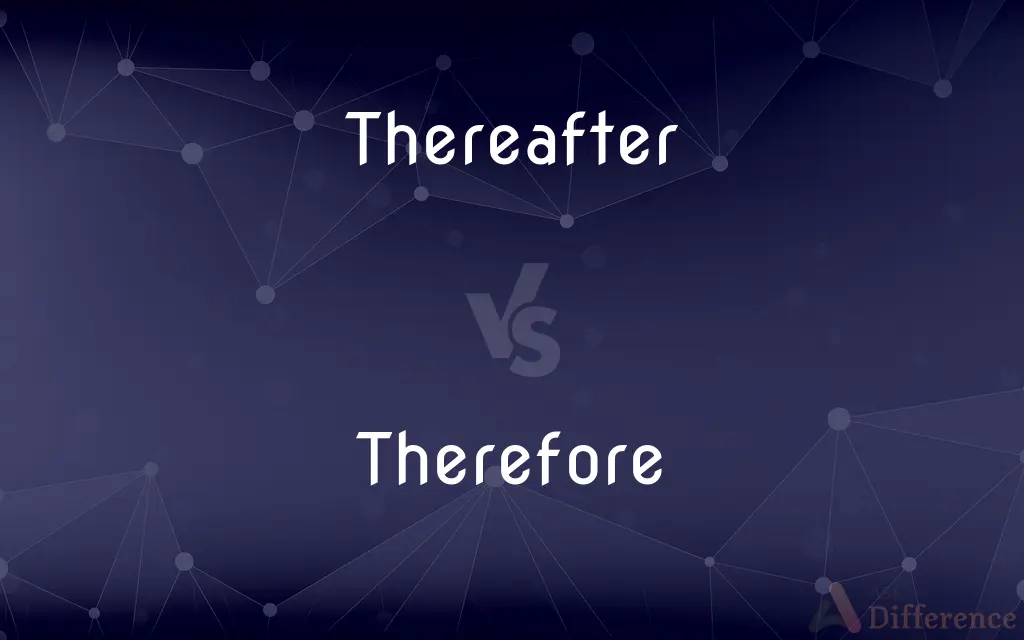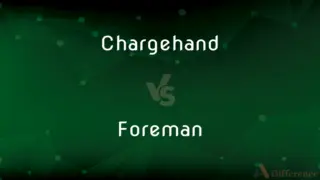Thereafter vs. Therefore — What's the Difference?
By Urooj Arif & Fiza Rafique — Updated on March 19, 2024
Thereafter refers to after a certain point in time, focusing on sequences, while therefore signifies a conclusion or result, highlighting causality.

Difference Between Thereafter and Therefore
Table of Contents
ADVERTISEMENT
Key Differences
Thereafter is used when discussing events in terms of sequence, indicating what happens after a specific point in time. Therefore, on the other hand, is employed to denote causality or reason.
Thereafter emphasizes the order of events without necessarily linking them by cause and effect. It's about what comes next in time, not why something happens. Therefore is critical in logical arguments, scientific explanations, and rational discourse where understanding the linkage between cause and effect is essential.
Thereafter and Therefore serve different rhetorical purposes. The former is more about narrative coherence, ensuring that a story or sequence of events is followed logically over time. Meanwhile, "therefore" is about logical coherence, ensuring that the reasoning process—from premise to conclusion—is clear and justified.
Comparison Chart
Definition
Indicates what happens after a specific point in time
Signifies a conclusion or result based on a cause or reason
Usage
In narratives or instructions to denote sequence
In arguments or explanations to denote causality
ADVERTISEMENT
Example
"He moved to New York; thereafter, he started a new job."
"It was raining heavily; therefore, the match was postponed."
Purpose
To outline chronological progression
To illustrate cause and effect
Common Contexts
Historical accounts, biographies, step-by-step instructions
Academic writing, logical arguments, scientific explanations
Compare with Definitions
Thereafter
Implies continuation in time from a particular moment.
The CEO retired, and the company saw major restructuring thereafter.
Therefore
Often used in formal arguments or scientific discussions to denote inference.
All humans are mortal; Socrates is human; therefore, Socrates is mortal.
Thereafter
Refers to the time after a certain event or point in time.
After the agreement was signed, the two countries increased their trade significantly thereafter.
Therefore
Implies a cause-and-effect relationship between two statements.
She studied hard for the exams; therefore, she scored highly.
Thereafter
Marks a progression in a narrative or process.
They met in 2001, and their friendship grew stronger thereafter.
Therefore
Used to introduce a logical conclusion or result from a given premise.
The road was icy; therefore, driving conditions were dangerous.
Thereafter
Can denote a period following a specified event in history or a story.
The empire expanded rapidly in the years thereafter.
Therefore
Marks the deduction or inference drawn from premises or facts.
The company is expanding; therefore, they are hiring more staff.
Thereafter
Used to indicate subsequent events in a sequence.
She graduated from college, and thereafter, pursued a master's degree.
Therefore
Signifies the reasoning behind a conclusion or action.
He was not feeling well; therefore, he decided to stay home.
Thereafter
From a specified time onward; from then on.
Therefore
For that reason or cause; consequently or hence.
Thereafter
After that, from then on; thenceforth.
He left; thereafter we never met again.
Therefore
(conjunctive) Consequently, by or in consequence of that or this cause; referring to something previously stated.
Traditional values will always have a place. Therefore, they will never lose relevance.
Thereafter
After that; afterward.
Therefore
For that; for it (in reference to a previous statement)
Thereafter
According to that; accordingly.
I deny not but that it is of greatest concernment in the church and commonwealth to have a vigilant eye how books demean themselves as well as men; and thereafter to confine, imprison, and do sharpest justice on them as malefactors.
Therefore
For that or this reason, referring to something previously stated; for that.
I have married a wife, and therefore I can not come.
Behold, we have forsaken all, and followed thee; what shall we have therefore?
Thereafter
Of that sort.
Therefore
Consequently; by consequence.
He blushes; therefore he is guilty.
Thereafter
From that time on;
Thereafter he never called again
Therefore
(used to introduce a logical conclusion) from that fact or reason or as a result;
Therefore X must be true
The eggs were fresh and hence satisfactory
We were young and thence optimistic
It is late and thus we must go
The witness is biased and so cannot be trusted
Therefore
As a consequence;
He had good reason to be grateful for the opportunities which they had made available to him and which consequently led to the good position he now held
Common Curiosities
What is the main use of "thereafter"?
To indicate what happens after a specific event or point in time, focusing on the chronological sequence of events.
Can "thereafter" and "therefore" be used interchangeably?
No, they serve different purposes; "thereafter" is about sequence in time, while "therefore" is about logical consequence.
Is "therefore" more suited for academic or formal writing?
Yes, "therefore" is typically used in academic, scientific, and formal writing to denote cause and effect or logical conclusions.
Is "thereafter" more common in narrative writing?
Yes, it is often used in narratives, historical accounts, and instructions to denote the sequence of events.
How is "therefore" primarily used?
To signify a conclusion or result that logically follows from a previous statement or premise, emphasizing causality.
Does "therefore" imply a direct cause-and-effect relationship?
Yes, it is used to connect a result directly with its cause or reason.
Can "therefore" be used in everyday conversation?
While it can be, it is more commonly found in structured or formal discourse due to its logical implications.
How do "thereafter" and "therefore" differ in logical structure?
"Thereafter" relates events in time without implying causation, while "therefore" explicitly connects a premise to a conclusion.
Can "thereafter" indicate immediacy?
It implies a sequence that follows over time, not necessarily immediate succession.
Is "thereafter" used in formal documents?
Yes, especially in legal documents, historical narratives, and formal reports to indicate sequences.
How does "thereafter" contribute to storytelling?
It helps in maintaining chronological coherence by indicating what happens next in the story or sequence.
Why is "therefore" important in arguments?
It's crucial for establishing a logical connection between cause and effect, helping to draw conclusions based on premises.
What are some synonyms for "therefore"?
Synonyms include "consequently," "hence," and "thus."
Can the misuse of "thereafter" and "therefore" affect clarity in writing?
Yes, incorrect use can lead to confusion about whether a sequence or a cause-and-effect relationship is being described.
Does "thereafter" have synonyms?
Synonyms include "afterwards," "subsequently," and "following that."
Share Your Discovery

Previous Comparison
Aerobics vs. Calisthenics
Next Comparison
Chargehand vs. ForemanAuthor Spotlight
Written by
Urooj ArifUrooj is a skilled content writer at Ask Difference, known for her exceptional ability to simplify complex topics into engaging and informative content. With a passion for research and a flair for clear, concise writing, she consistently delivers articles that resonate with our diverse audience.
Co-written by
Fiza RafiqueFiza Rafique is a skilled content writer at AskDifference.com, where she meticulously refines and enhances written pieces. Drawing from her vast editorial expertise, Fiza ensures clarity, accuracy, and precision in every article. Passionate about language, she continually seeks to elevate the quality of content for readers worldwide.
















































